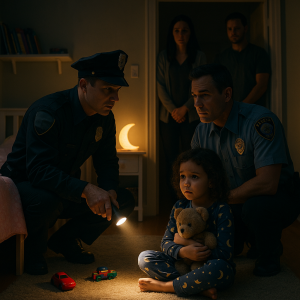The Inheritance That Changed Everything
I’m Catherine Wells, seventy-eight years old, and I thought I knew what family meant. After decades of single motherhood following my husband’s death in the Vietnam War, I believed the connections I’d built with my four children were forged in steel. How devastatingly wrong I was.
This is how my final act of generosity became the mirror that reflected my family’s true souls, and how one widow’s careful planning transformed her greatest weakness into her strongest defense.
The Heart of Our Home
For thirty-five years, my Victorian home on Maple Street had been our family’s anchor. Within these walls, I’d watched Robert, Linda, Michael, and Patricia grow from babies to adults, celebrating every milestone while rebuilding our lives after tragedy struck when I was just twenty-nine.
Though my children had scattered across the country pursuing careers and dreams, they faithfully returned for holidays and gatherings. This house remained our north star, the sacred space where we’d maintained our bonds through all of life’s storms.
As my late seventies approached, their visits grew more frequent, accompanied by gentle concerns about my solitary life in such a sprawling home. Their worry seemed genuine—the natural protectiveness of loving children watching their mother age. I found their attention touching and began considering whether change might indeed be wise.
An Unexpected Windfall
Everything shifted when my pharmaceutical company announced an acquisition. After twenty-five years as a research coordinator, I was offered an early retirement package that took my breath away: $1.2 million lump sum, plus continued healthcare and a modest pension.
At seventy-eight, I was decades past typical retirement, but I’d continued part-time consulting because I thrived on the mental stimulation. This offer, however, was impossible to ignore.
When I shared the news at our monthly family dinner, the atmosphere electrified instantly. Robert, my eldest and a financial advisor, immediately launched into investment calculations. Linda, working in real estate, began discussing property diversification strategies.
Michael and Patricia, both struggling financially, exchanged looks they thought I missed. Our conversation stretched past midnight, each child eagerly offering detailed guidance on managing this sudden wealth.
The Caring Children
Within days, my children’s involvement in my life intensified dramatically. Daily phone calls replaced weekly check-ins. Visits multiplied. Offers of help with tasks I’d managed independently for decades poured in.
Robert arrived with elaborate financial planning presentations, charts projecting how his professional management could secure my future. He graciously volunteered to handle my entire investment portfolio, emphasizing his expertise in navigating complex financial waters.
Linda brought stacks of real estate listings, highlighting properties she deemed more appropriate for my age. She focused on assisted living communities and senior developments offering comprehensive care and social programs.
“You’ve sacrificed everything for us, Mom,” she’d say, spreading glossy brochures across my kitchen table. “Isn’t it time to let others shoulder the daily burdens so you can simply enjoy life?”
Michael and Patricia approached differently, emphasizing emotional bonds and shared resources. They spoke about ensuring family wealth benefited everyone, suggesting combined resources could better secure the grandchildren’s futures.
Their arguments felt persuasive, rooted in apparent love and genuine concern. For weeks, I seriously considered their proposals, feeling blessed to have children who cared so deeply.
The Hidden Truth
What I didn’t realize was that my children had been secretly investigating my finances for months before my retirement announcement. They’d been tracking my spending, researching my property values, and calculating their potential inheritance.
I discovered this surveillance accidentally when Patricia’s teenage daughter Emma helped organize my home office. Emma found a hidden folder containing detailed financial records I’d never seen—documents obtainable only through unauthorized access to my accounts.
The folder held printouts of my balances, copies of my will and insurance policies, and market valuations of my home and belongings. Most chilling were handwritten notes discussing strategies for convincing me to enter assisted living and transfer asset control “for my protection.”
Emma was devastated. “Grandma,” she whispered through tears, “I don’t think they’re trying to help you. I think they want to rob you.”
Her words hit like lightning, but they explained the unease I’d been feeling about my children’s sudden financial obsession.
Strategic Planning
Rather than immediate confrontation, I chose investigation. I spent weeks quietly documenting their behavior, recording conversations, and researching legal implications of their unauthorized access.
I consulted my longtime attorney, James Morrison, who’d handled my affairs for twenty years and understood our family dynamics.
“Catherine,” he said gravely, “you’re describing coordinated elder financial abuse. It’s tragically common, especially devastating when family perpetrates it.”
He recommended immediate protective measures: password changes, new secret accounts, and additional legal safeguards against unauthorized access.
Most importantly, he suggested testing my children’s true motivations through a controlled scenario that would reveal their actual priorities.
The Character Test
Working with James, I devised a plan to determine whether my children’s concern was genuine or greed-driven. We created a fabricated medical crisis requiring immediate decisions about my care and finances.
I arranged for my doctor to inform my children I’d been diagnosed with early-stage dementia, requiring transition to supervised care within months. The doctor explained that while not immediately life-threatening, my condition demanded careful monitoring and eventual memory care placement.
This completely fictional crisis would test their priorities. Would they focus on ensuring excellent care, or immediately position themselves to control my assets?
James also created fake legal documents suggesting I was considering a family trust distributing my assets while I lived. This paperwork would be “accidentally” discovered during their visits.
Truth Revealed
The results were devastating but unsurprising. Hours after receiving the fake diagnosis, my children arranged an emergency meeting to discuss “Mom’s situation” and necessary immediate actions.
From the adjacent room, I listened as they discussed my future with clinical coldness and shocking callousness. Robert immediately outlined strategies for obtaining power of attorney and financial control. Linda researched the cheapest memory care facilities, prioritizing cost over quality.
Most heartbreaking, Michael and Patricia discussed “accelerating the timeline” for asset transfer, suggesting they move quickly before my condition complicated legal processes.
“We need to face reality,” Robert said emotionlessly. “Mom will need expensive care for years, significantly eating into our inheritance. Establishing the trust now protects assets while ensuring adequate care.”
Linda agreed: “The house alone is worth $800,000, plus the retirement money makes nearly two million. We can’t let nursing home costs destroy what proper planning could preserve for the family.”
Their two-hour conversation detailed my net worth, efficient methods for legal control, and strategies minimizing care costs while maximizing their financial benefit.
Not once did anyone express genuine concern for my emotional wellbeing, care preferences, or wishes for my remaining years. I’d become merely a financial problem to solve and an asset to manage.
The Counter-Attack
Armed with recorded conversations and documented evidence, I began comprehensive planning to protect myself and ensure my assets would be distributed according to my actual wishes, not their schemes.
With James, I established a revocable trust managing all assets during my lifetime and distributing them based on carefully considered character criteria after death. The trust prevented any single beneficiary from controlling substantial assets without meeting specific behavioral conditions.
I documented my children’s unauthorized financial access and manipulation plans. This evidence would support legal action if necessary to protect my interests.
Most importantly, I decided to reveal the truth about my fabricated diagnosis in a way forcing them to confront their behavior and its consequences.
The Revelation
I arranged Sunday family dinner, explaining I wanted to discuss my medical situation and make important care decisions. They arrived eager and prepared, having spent the week developing detailed plans for managing my transition and gaining financial control.
I began by thanking them for their concern and acknowledging that health changes would require adjustments to my living and financial arrangements. Their faces showed sympathetic concern mixed with barely concealed anticipation.
Then I revealed the truth.
“Before we discuss care needs,” I said calmly, “I must address something important. Last week’s medical diagnosis was fabricated. I don’t have dementia and don’t require supervised care or financial assistance.”
The silence was profound and telling. Instead of relief about my health, their faces showed confusion, anger, and what appeared remarkably like disappointment.
“I created this test,” I continued, “because I discovered evidence you’d been accessing my financial information without permission and planning to manipulate me into transferring asset control.”
I then played recordings of their conversations, letting them hear their own voices discussing my financial worth and debating control strategies while minimizing care costs.
The Ugly Truth
The confrontation that followed was brutal and revealing in ways that still pain me. Rather than expressing shame or remorse, my children became defensive and angry that I’d “tricked” them into revealing their true intentions.
Robert accused me of paranoid manipulation, claiming their financial planning stemmed from love and concern. Linda insisted their care discussions were practical conversations about inevitable realities I was too stubborn to acknowledge.
Michael and Patricia argued differently, contending family wealth should be shared and managed collectively rather than hoarded by someone potentially incapable of sound financial decisions indefinitely.
“You’re seventy-eight, Mom,” Patricia said with bone-chilling coldness. “Whether you admit it or not, you’ll need our help eventually. We were simply preparing for that reality.”
“And honestly,” Michael added, “after everything we’ve endured as a family, don’t we deserve consideration? We’ve been good children and earned the right to benefit from your accumulated wealth.”
Their words revealed fundamental misunderstanding of both family relationships and financial responsibility. They viewed my assets not as products of my work and sacrifice, but as family resources they’d somehow earned through their existence as my children.
Financial Justice
The immediate consequence was complete estate plan restructuring. I removed all four children as beneficiaries of life insurance and retirement accounts, replacing them with charitable organizations aligned with my values.
I created a new will leaving my house and possessions to Emma, the only family member showing genuine concern for my welfare rather than wealth. Emma would inherit everything at twenty-five, with assets held in trust and managed by independent trustees until then.
The trust document included detailed explanations of my decisions, ensuring Emma would understand why her parents and relatives were excluded and learn the importance of treating family relationships as more than financial transactions.
My children would receive modest $10,000 bequests—enough to prove their exclusion was intentional, not accidental, but insufficient to provide the windfall they’d planned to obtain through manipulation.
Legal Warfare
My children’s response to learning about their disinheritance was swift and predictable. They hired attorneys and challenged my mental competency, claiming my decision was evidence of cognitive decline or outside manipulation.
The ensuing legal battle was exhausting and emotionally devastating, but I was well-prepared. Recordings of their conversations provided clear evidence of their motivations, and comprehensive medical evaluations confirmed my competency and decision-making ability.
Their lawyers eventually advised that their case was weak and expensive, with continued litigation likely resulting in additional costs without realistic success prospects. The challenges were dropped after six months of contentious fighting.
The Cost of Truth
Discovering my children’s true character and protecting my assets cost me all family relationships. None of my children speak to me now, and I’ve been excluded from gatherings and celebrations.
My grandchildren, except Emma, have been told I’m a bitter, unreasonable old woman who chose money over family. Most believe this narrative and maintain limited contact.
The isolation is painful but honest. The relationships I lost were built on false foundations and sustained by my willingness to overlook unacceptable behavior. The love I thought we shared was conditional and transactional in ways I’d refused to acknowledge.
New Purpose
Rather than letting lost family relationships define my remaining years, I focused on creating something meaningful with my protected resources. I established the Catherine Wells Foundation, dedicated to preventing elder financial abuse and supporting seniors victimized by family members.
The foundation provides legal assistance, counseling services, and financial support to elderly individuals facing exploitation from relatives. It funds research into psychological and social factors contributing to family-based elder abuse.
Working with the foundation has given me purpose and connection deeper and more satisfying than the superficial family relationships I’d maintained. The people I work with appreciate my contributions for themselves, not because they hope to inherit from me eventually.
Unexpected Allies
The most surprising development has been emergence of unexpected allies and genuine relationships growing from my decision to prioritize honesty over comfort. Emma has become a close friend and confidant who visits regularly and genuinely enjoys my company.
Several neighbors, who’d witnessed my children’s increasingly frequent visits and sensed something amiss, revealed they’d been concerned about my welfare for months. They’d noticed changes in my children’s behavior and how they seemed to treat my house more like a business opportunity than a family home.
James has become not just a legal advisor but a trusted friend sharing my commitment to protecting elderly individuals from financial exploitation. We collaborate on foundation projects and have developed educational programs for seniors about recognizing and preventing family-based financial abuse.
Bitter Irony
Ironically, two years after my fabricated crisis, I received a legitimate health diagnosis requiring significant lifestyle adjustments. I was diagnosed with early-stage Parkinson’s disease, eventually limiting my mobility and independence.
When Emma learned of my diagnosis, her response embodied everything I’d hoped my children’s reaction would have been to my fake crisis. She immediately researched treatment options, interviewed home care providers, and arranged for me to remain in my house while receiving appropriate medical support.
Her genuine concern and practical assistance highlighted the stark contrast between real love and the manipulative behavior my children demonstrated when they thought I needed help.
Lasting Legacy
The trust structure I established has proven effective for protecting elderly individuals from financial exploitation while ensuring family wealth transfers to recipients demonstrating appropriate values and character.
Several other seniors who learned about my situation through the foundation have implemented similar arrangements, protecting their assets from potentially exploitative family members while rewarding relatives showing genuine care and respect.
The trust document has become a template we share with other families facing similar challenges, providing legal framework ensuring inheritance decisions are based on character and behavior rather than biological relationships.
Educational Impact
My story has been shared at numerous conferences and seminars focused on elder rights and family financial planning. Recordings of my children’s conversations have become powerful teaching tools helping professionals recognize warning signs of family-based financial exploitation.
The foundation has developed educational materials helping seniors understand their rights and options when facing family pressure to transfer asset control. We emphasize maintaining financial independence as long as possible and seeking outside help when family relationships become complicated by money.
Many workshop attendees express relief learning their concerns about family members’ behavior are legitimate and that resources exist to help protect their interests.
Redefining Family
The most painful aspect has been fundamentally redefining my understanding of family relationships and parental responsibilities. For decades, I believed unconditional love and support would naturally create bonds of mutual respect and care enduring throughout our lives.
I learned that family relationships, like all relationships, require ongoing maintenance and mutual respect to remain healthy. When love becomes conditional on financial benefit, it ceases being love and becomes something transactional and ultimately destructive.
The children I raised were capable of love, but had somehow learned to view that love as something providing material benefits rather than emotional satisfaction. My parental failure wasn’t in loving them, but in failing to teach them that love should be given freely without expectation of reward.
Community of Survivors
Through foundation work, I’ve met hundreds of seniors experiencing similar family betrayals. Their stories are remarkably consistent: adult children viewing parents’ assets as inheritance they’re entitled to receive immediately rather than gifts that might be given voluntarily.
Many seniors struggle with guilt and failure, wondering what they did wrong to raise children who’d treat them as funding sources rather than people deserving respect and care. Our support groups help them understand they’re not responsible for their adult children’s choices and that protecting themselves from exploitation is both appropriate and necessary.
The survivor community has become a source of genuine family-like relationships for many of us. We support each other through health crises, celebrate achievements, and provide the unconditional care that should exist within biological families but sometimes doesn’t.
Financial Victory
The protective financial strategies have proven remarkably successful beyond simple asset protection. Investments managed by independent trustees have grown substantially, providing more charitable resources and ensuring Emma’s eventual inheritance will exceed original plans.
The foundation has become financially self-sustaining, generating enough endowment income to fund operations and programs without requiring ongoing contributions from my personal assets. This independence ensures the foundation’s work will continue long after I’m gone.
My financial security remains strong, providing resources to maintain independence and receive high-quality Parkinson’s care. The money my children hoped to inherit is instead funding a meaningful, productive life serving purposes larger than personal comfort.
Legal Precedent
The legal case from my children’s estate challenge has become significant elder law precedent, establishing important principles about mental competency assessments and seniors’ rights to make inheritance decisions based on their children’s behavior and character.
The court affirmed that elderly individuals have the right to exclude family members from inheritances when those members demonstrate exploitative or manipulative behavior. This decision has been cited in numerous subsequent cases involving similar family dynamics.
Legal professionals now use my case as an example of how careful documentation and strategic planning can protect seniors from family-based financial exploitation while ensuring their wishes are respected and enforced after death.
Personal Peace
The most valuable outcome has been developing personal peace and authenticity I’d never experienced while maintaining relationships built on false pretenses. I no longer feel obligated to pretend hurtful behavior is acceptable simply because it comes from family members.
My days are filled with meaningful activities, genuine relationships, and satisfaction knowing my resources create positive world change. I sleep well, knowing I’ve protected myself from exploitation and created systems that will continue helping others long after I’m gone.
The house once centering false family gatherings has become a refuge for authentic relationships and meaningful work. Emma visits regularly, bringing friends and sharing college experiences and future plans. Rooms that once echoed with manipulative conversations now host foundation meetings and support groups for elderly individuals seeking help with family-based financial abuse.
Continuing Mission
As I face Parkinson’s progression and inevitable changes to my independence and capabilities, I’m confident that systems I’ve established will protect my interests and continue my work even when I can no longer actively manage them.
Emma has expressed interest in eventually leading the foundation, bringing her own ideas and energy to the mission of protecting seniors from financial exploitation. Her generation understands family dynamics and financial relationships in ways that might prevent the exploitation previous generations simply accepted as normal.
My trust arrangements will ensure resources remain available for foundation work while providing Emma financial security to pursue her goals without the burden of caring for aging parents who might view her as a funding source rather than a person deserving love and respect.
Final Reflection
When I review events leading from my retirement announcement to complete family relationship and financial restructuring, I’m struck by how much can change when people show you who they really are and you choose to believe them.
My children revealed themselves as individuals viewing their mother primarily as potential wealth rather than a person deserving love and respect. That revelation was painful but ultimately liberating in ways I’m still discovering.
The money they hoped to inherit through manipulation is instead funding programs helping other seniors avoid similar betrayals. The house they viewed as a valuable asset has become a center for genuine community and meaningful work.
The relationships that mattered most—those built on mutual respect and genuine care—have survived and grown stronger. Relationships based on false pretenses and conditional love have been revealed for what they always were and discarded accordingly.
At seventy-eight, I’m healthier emotionally and spiritually than I’ve been in decades. I’m surrounded by people who value me for who I am rather than what I can provide, and I’m using my resources to create positive change that will outlast my life.
The inheritance that revealed everything wasn’t the money from my retirement package, but the knowledge I gained about the true character of those I’d loved most. That knowledge was painful to acquire, but ultimately the most valuable gift I could have received.
I’ve learned that family is defined by behavior, not biology, that love should never come with financial conditions, and that protecting yourself from exploitation isn’t selfish but necessary for maintaining dignity and respect every person deserves throughout life.
My story of betrayal by my children has become a story of liberation, purpose, and discovery that it’s never too late to build a life based on authenticity rather than obligation. That may be the most important lesson I can share: sometimes the greatest gift you can give yourself is the courage to acknowledge the truth about those you love and act accordingly to protect your wellbeing and dignity.





